Less waste, more life
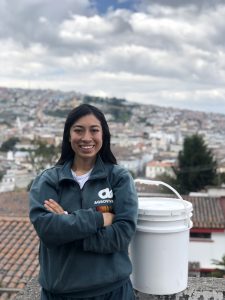 When Legny Vivas (‘17, Ecuador) was a teenager, she had a dilemma. She couldn’t decide whether to study electricity or accounting. But then she began to see the passion her mother had for agriculture, for finding small spaces to grow plants at their family home in the middle of the hustle and bustle of the capital city of Quito. Legny and her family built an urban garden where they grew many of the foods they consumed daily – tomatoes, lettuce, and many other kinds of vegetables. Her mother’s passion inspired her and is what led her not only to train as an agronomist at EARTH, but to seek solutions to one of Quito’s and the world’s pervasive problems: how to manage organic waste.
When Legny Vivas (‘17, Ecuador) was a teenager, she had a dilemma. She couldn’t decide whether to study electricity or accounting. But then she began to see the passion her mother had for agriculture, for finding small spaces to grow plants at their family home in the middle of the hustle and bustle of the capital city of Quito. Legny and her family built an urban garden where they grew many of the foods they consumed daily – tomatoes, lettuce, and many other kinds of vegetables. Her mother’s passion inspired her and is what led her not only to train as an agronomist at EARTH, but to seek solutions to one of Quito’s and the world’s pervasive problems: how to manage organic waste.
When Legny arrived in Costa Rica to study at EARTH, she began working at the University’s Recycling Sorting Center to pay off a loan for her airline tickets. While separating paper and other solid waste, she thought about the trash problem in her country.
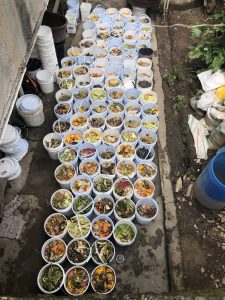 “In Ecuador, we have a big problem with waste management. Many people burn their garbage and 96% of the waste generated in Quito is not recycled. The landfills are collapsing. At EARTH, I saw how waste can be properly managed, and I wanted to apply what I was learning in my country. I understood that composting could be a key tool to impact society sustainably, and it’s feasible because it doesn’t require much machinery or technology. I believe that simple and small actions can generate big impact, and that’s what we do at Agrovivas,” explains Legny.
“In Ecuador, we have a big problem with waste management. Many people burn their garbage and 96% of the waste generated in Quito is not recycled. The landfills are collapsing. At EARTH, I saw how waste can be properly managed, and I wanted to apply what I was learning in my country. I understood that composting could be a key tool to impact society sustainably, and it’s feasible because it doesn’t require much machinery or technology. I believe that simple and small actions can generate big impact, and that’s what we do at Agrovivas,” explains Legny.
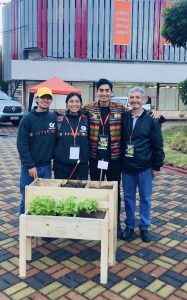 Legny and her family created Agrovivas to transform the organic waste problem in Quito. It works like this: small, 20 liter containers (“tachitos”) are given to families, individuals, and businesses that subscribe to the different plans Agrovivas offers. Once a week, the Vivas family travels around the city collecting the tachitos. They travel from house to house, store to store, and neighborhood to neighborhood to collect the containers and to provide a new container for the following week’s waste. After three months, Agrovivas provides each participant with 10 kilos of compost made from their organic waste. They also offer seedlings for different crops so people can plant and harvest their own food.
Legny and her family created Agrovivas to transform the organic waste problem in Quito. It works like this: small, 20 liter containers (“tachitos”) are given to families, individuals, and businesses that subscribe to the different plans Agrovivas offers. Once a week, the Vivas family travels around the city collecting the tachitos. They travel from house to house, store to store, and neighborhood to neighborhood to collect the containers and to provide a new container for the following week’s waste. After three months, Agrovivas provides each participant with 10 kilos of compost made from their organic waste. They also offer seedlings for different crops so people can plant and harvest their own food.
“Everything that was alive at some point in time can be composted. We always ask the families who participate, so if something doesn’t belong in the organic waste, they should separate it and deliver it to the recycling centers. However, what we primarily encourage is changing consumption habits. We tell people that if a product cannot be composted or recycled, they shouldn’t buy it and to plan their meals better so there is no waste.”
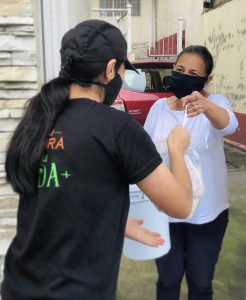 The fact that Agrovivas began forming during the COVID-19 pandemic proved to be a big challenge for Legny, but it was also an important opportunity to grow and support her family. The first step was making people aware of the importance of separating waste and teaching them how to use compost. Initially, the family arranged with 60 neighbors to manage gardens with the compost they processed. When they had to sell their car to support themselves during the pandemic, Legny and her siblings would go out with a wheelbarrow or on their bicycles to collect the waste from the participants. Sometimes they had to walk many miles and use public transportation to move the heavy bins. They were able to launch the business thanks to her siblings’ creativity, her parents’ determination, and her knowledge as an agronomist.
The fact that Agrovivas began forming during the COVID-19 pandemic proved to be a big challenge for Legny, but it was also an important opportunity to grow and support her family. The first step was making people aware of the importance of separating waste and teaching them how to use compost. Initially, the family arranged with 60 neighbors to manage gardens with the compost they processed. When they had to sell their car to support themselves during the pandemic, Legny and her siblings would go out with a wheelbarrow or on their bicycles to collect the waste from the participants. Sometimes they had to walk many miles and use public transportation to move the heavy bins. They were able to launch the business thanks to her siblings’ creativity, her parents’ determination, and her knowledge as an agronomist.
In 2022, Agrovivas won several sustainability contests and received seed money to buy a truck to improve logistics and optimize collection. The family business now has over 300 subscriptions and processes around 11 tons of organic waste every month.
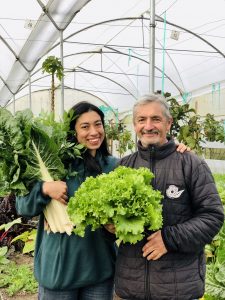 “It was a great process because it created a shift where people no longer saw their organic waste as garbage but as a source of life and resilience. All of this started as a community activity of people organized for and concerned about the environment. It’s turned into a sustainable business that has grown throughout Quito. We succeeded with a lot of commitment,” says Legny.
“It was a great process because it created a shift where people no longer saw their organic waste as garbage but as a source of life and resilience. All of this started as a community activity of people organized for and concerned about the environment. It’s turned into a sustainable business that has grown throughout Quito. We succeeded with a lot of commitment,” says Legny.
Another significant contribution Legny and Agrovivas is making to the community is connecting their business with the grassroots work of women recyclers, a group of women essential to solid waste collection, to the cleaning up of cities, and to the protection of the environment. Legny has developed a working model that includes the women waste pickers, so while she collects organic waste, the women recyclers visit the same homes and businesses gathering solid waste. The comprehensive effort includes raising awareness about separating and recycling materials such as plastic, paper, and aluminum. For Legny, including women recyclers has been crucial, not only because of the importance of their work, but to recognize their dignity, which is not often acknowledged in society.
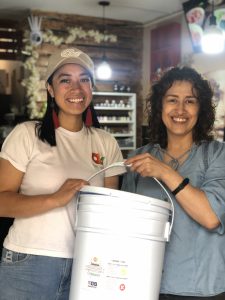 “Less waste, more life” is the slogan Legny has printed on the back of her blue coat. It is her life’s motto and the purpose and motivation for which she, her three brothers, and her parents get up every morning, knowing their work can generate a huge change in Quito, Ecuador, and the world.
“Less waste, more life” is the slogan Legny has printed on the back of her blue coat. It is her life’s motto and the purpose and motivation for which she, her three brothers, and her parents get up every morning, knowing their work can generate a huge change in Quito, Ecuador, and the world.
Thank you, Legny, for being an inspiration and showing us that actions that seem small can have a huge impact!




